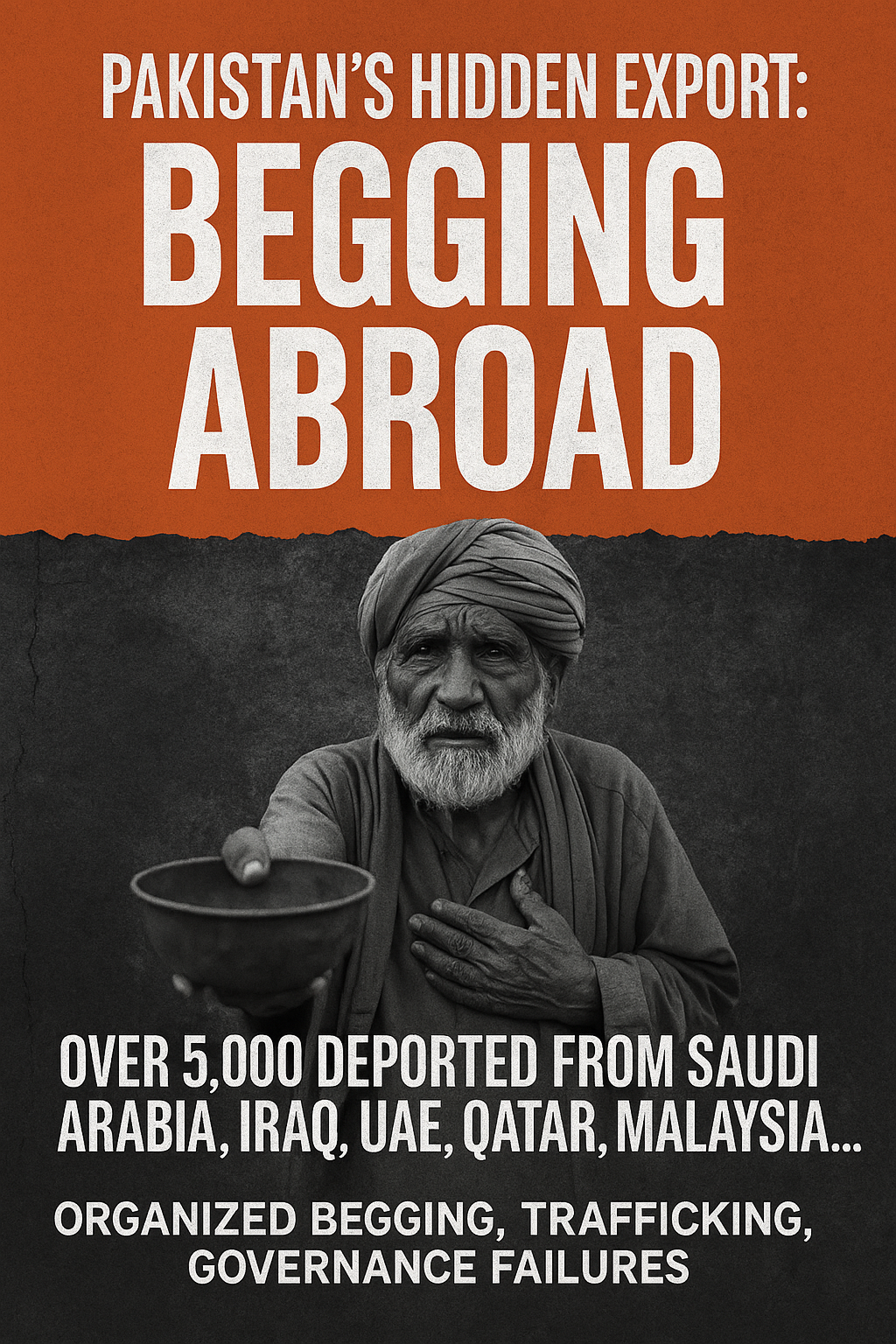Pakistan’s Hidden Export: The Shameful Economy of Begging Abroad
By Remedy Talks Editorial Team
When poverty becomes a business model and shame is shipped overseas.
There’s no easy way to say it: Pakistan is now exporting beggars.
Over 5,000 Pakistani nationals have been deported from countries like Saudi Arabia, Iraq, the UAE, Qatar, and Malaysia in just the past 16 months. The revelation came straight from the country’s interior minister—publicly admitted in parliament. What should’ve sparked national outrage has instead been met with silence.
This isn’t just another headline. It’s a damning reflection of how deep poverty, human trafficking, and state neglect have intertwined to form an industry of exploitation—and it’s turning Pakistan into a global embarrassment.
Beyond Poverty: The Rise of the Begging Mafia
Let’s be clear: not every deported person was a desperate soul looking for food or shelter. Many were part of organized begging rings—a full-fledged, cross-border racket that sends individuals abroad under false pretenses, only to exploit them on foreign streets.
And it’s not a small operation either. Reports estimate that this “industry” within Pakistan pulls in billions of rupees annually, operating in broad daylight with the help of trafficking agents, fake visa handlers, and local enablers.
The sad truth? Begging is no longer just a symptom of poverty; it has become a profitable economy—one that thrives on the backs of society’s most vulnerable.
Deportation Stats: The Shame in Numbers
According to official data:
- 52% of those deported for begging hail from Sindh,
- followed by Punjab and Khyber Pakhtunkhwa.
- Thousands are now on the Exit Control List (ECL), banned from traveling abroad.
But let’s not kid ourselves. Adding names to a no-fly list doesn’t address the core issue. That’s like bandaging a bullet wound while ignoring the gunfire.
Who’s Really at Fault?
The begging crisis in Pakistan isn’t just about those holding out their hands—it’s about the systems failing them:
- Governance breakdown has allowed trafficking rings to operate without fear.
- Weak employment policies offer no alternatives to those pushed to the margins.
- Lack of vocational education and rehabilitation programs means there’s no way back for many once they’re on the streets.
- Charity culture, while noble, is often unregulated—fueling exploitation by rewarding beggars without questioning who’s behind them.
So when foreign governments crack down and publicly shame us by deporting thousands, we have to ask:
Where is our shame at home?
The International Fallout
The diplomatic implications are serious. Countries that once offered Pakistanis employment opportunities are now tightening visa restrictions. This doesn’t just hurt those involved in begging networks—it punishes hardworking migrants, laborers, and professionals who now face suspicion, stigma, and rejection at every border.
Imagine losing the moral and legal standing to defend your citizens abroad—because the world has started associating your passport not with talent or trade, but with organized begging.
The Way Out: Fixing the Root, Not Just the Rot
If the state can track down and detain thousands of undocumented Afghans, it can certainly dismantle domestic trafficking and begging mafias. The question isn’t “how”—it’s whether there’s political will to go beyond surface-level solutions.
Real steps must include:
- Cracking down on human trafficking networks that facilitate illegal travel for begging.
- Rehabilitating beggars through job training, microfinance, and skill development, particularly in high-risk regions like Karachi, interior Sindh, and south Punjab.
- Launching widespread awareness campaigns to expose the exploitation behind “charitable” street begging.
- Strengthening child protection units to stop the recruitment of children into these criminal operations.
- Punishing ringleaders with real legal consequences, not just public shaming.
And perhaps most importantly—educating the public. Your loose change might feel like compassion, but it could be fueling an underground economy of abuse.
A National Wake-Up Call
This is not just a story of deportation—it’s a warning sign.
When a nation becomes known for sending its poor to beg abroad, when children are trafficked for sympathy, and when poverty is weaponized as profit—we have lost more than just our international dignity. We’ve lost our moral compass.
There is no quick fix. But ignoring it will only make it worse. Pakistan must recognize that this isn’t just about optics or reputation—it’s about reclaiming human dignity, at home and abroad.
Final Word:
You can’t solve begging with a blacklist.
You can only solve it by giving people a life where they don’t have to beg to survive.
